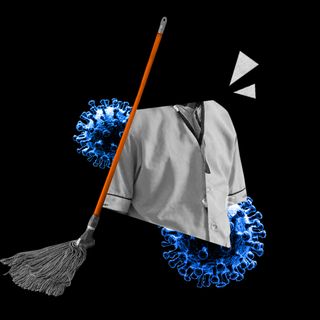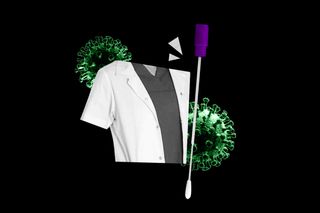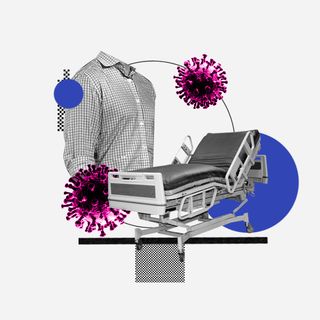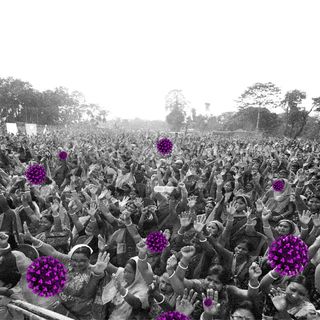
The Second Wave: A Lab Technician Who Sleeps 3 Hours a Day Says “What Keeps Me Going Is That I Know I Have To Do This”
We compiled portraits of frontline healthcare workers’ experiences in India’s current pandemic crisis. In this installment: A 24-year-old lab technician in New Delhi.

Richa Shakya, a 24-year-old lab technician in New Delhi, shares what her day looks like on the frontlines of the pandemic. This is the sixth installment of a series that looks at the toll of a worsening Covid19 crisis from multiple perspectives within the healthcare system.
I am from Ambala and I’m working as a lab technician in New Delhi right now. I take Covid, RT-PCR tests these days. I have worked as a technician for the last three years, and was working in molecular testing before this. I’ve been doing Covid tests since last year.
Since Covid has increased in intensity so much right now, we don’t realize what time our day starts and what time it ends. Earlier, our lab timing was between 8 am to 8 pm; now the workload is such that the work doesn’t end at this time, we often work till late 2-3 am. Every patient is in a rush for their reports, everyone is down with some Covid19 symptom. They need reports for hospital admission, taking flights, or any medicine prescription — for everything they need a report.
So work hours have inevitably increased for us; more responsibilities have increased the work. These days I’m doing night shifts, so I come at 8 p.m. and work till about 9 a.m. We take our laptops when we go back home in the morning to file the reports of tests we ran at night, which goes on till the afternoon. I try to squeeze in a nap for three-four hours in the evening and then come back to work around 8 p.m. These days, work continues 24×7.
Each batch [of RT-PCR testing] takes about three hours at least. We have two machines, 1-2 RNA which helps to complete work. While taking tests, we wear PPE, sanitize before wearing PPE and after wearing it, only then we step outside of our department.
As compared to the last Covid wave, this time the work is much higher, the difference is palpable. Last time, we used to work till 3/3:30 a.m. latest (as opposed to now 9 a.m.). But now, the workload is so much, that is why it feels like we’re working round the clock; people are working in two 12-hour shifts, there are multiple batches in one day. We try to calm our patients down, telling them they will get reports on time and it will be okay. Because if we start misbehaving with them or being rude to them, their problem will also increase.
Of course, Covid is scary — everyone cares for their life and well-being. Especially if you’re living with your family, more than yourself you worry about their health. I’ve tested positive for Covid twice — the first time I recovered within five-six days and joined immediately afterward. I tested positive again recently, in April first week, and I got very sick — vomiting, dizziness, loss of appetite. It took six-seven days to recover, and then I joined back again.
The second Covid19 wave is much stronger. Even when I look at my two infections, I was asymptomatic the first time and recovered quite swiftly. This time, it took longer, and it was severe in its impact: I was down with fever, was very weak throughout, and needed a lot of medicines. Even if one or two people are on leave, the lab work is visibly disrupted; the burden is so much that the absence of one person disrupts the balance of work.
My family is worried, like every other family right now. They are concerned about us working during Covid and if we will get infected; when I got Covid, my parents asked me to leave my job and come home. I told them that instead of asking me to leave, they should be proud of me, we are trying to face the Covid fight head on.
There is a lot of shortage — especially oxygen supplies. Someone in my family itself needed oyxgen in Delhi, he couldn’t get it. I went to Ambala to check for resources, but even there we couldn’t find anything. There is a lot of problems with the oxygen shortage.
Back in January, we thought Covid was almost over — no one thought it would resurface back this strongly. Even if there were to be a second wave, we thought, it would come back in a similar intensity as before. We didn’t expect that it would sharply rise like this.
What keeps me going is that I know I have to do this. As a lab technician, this is my profession, and I will keep going forward with what is expected of me; there is no point in fretting over this. There is a level of exhaustion, but if we leave everything and sit at our homes, who will do this?
This interview has been condensed and edited for clarity. As told to Saumya Kalia.
Related


The Second Wave: A Hospital Admin Who Is Setting Up a New Covid Ward Says Staff “Morale Is A Challenging Thing Now”
